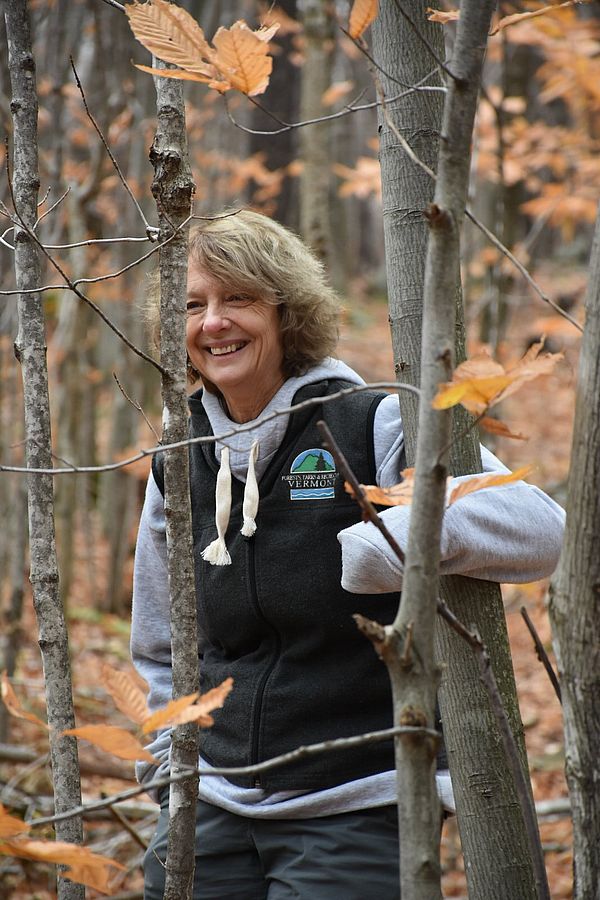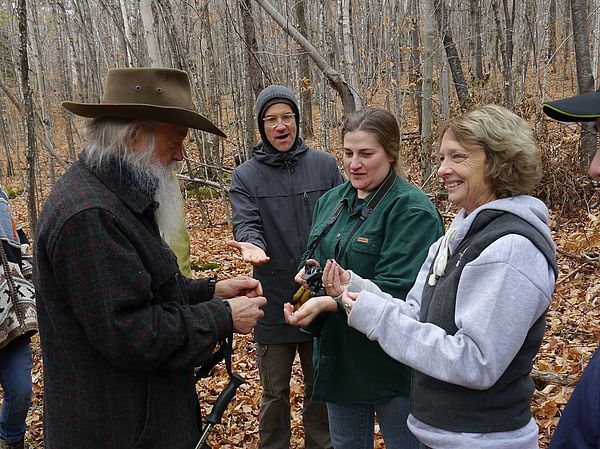On October 23, CHC's Board Vice-President Nancy Patch was honored with the Arthur Gibb Award from the Vermont Natural Resources Council. VNRC presents the award annually to a Vermont resident who has made a lasting contribution to their community, region or state in the ways they integrate smart growth and conservation.
Here we share a portion of Nancy's acceptance speech, which touches on her childhood in Enosburgh and what motivates her work with CHC and as a County Forester. You can read more about Nancy's story or view a recording of her speech at this link.
I would like to share a little bit about my story. I grew up in Enosburgh on a small beef farm within the village limits of Enosburg Falls. The farm and woods were my magic kingdom. My parents’ story was partly one of the Great Depression and WWII. They believed in security and family first. That small farm in the village was that security. Every time my father subdivided and sold part of our farm for a house lot, I cried. His need to provide for his family turned me into a conservationist wanting to protect and keep whole the forest and farms that I loved. Of course I later learned the value of building within the village centers, so my dad did OK.
I have always known what I wanted to do. I was still a child when I knew that forestry would be my profession. I came of age in the 70’s when a wave of young people were coming to VT in search of a better future. They brought with them the arts, music, education, and a dream for peace and social justice. These new Vermonters brought the skills and knowledge that would change VT forever and change it for the better. That was their story and as a teenager, just a little younger than they were, I saw them as my mentors. I learned what activism meant in my teens. I know many of you are part of that story, too.
We live in a beautiful place and I feel fortunate to have had so many mentors and colleagues to work with and learn from. You have heard now about Cold Hollow to Canada. What makes this organization so special is the fact that it is a bottom up organization. We are successful because we work with people where they are. We listen to their stories, and find out what matters to them. We are also transparent. We declared from the get go that our mission is to permanently conserve through easements 23,000 acres by 2030. This forest where we live is globally significant. The Northern Forest includes 4 states and 3 provinces covering an area from the Tughill Plateau west of the Adirondacks to the tip of Cape Breton. It is the most intact broad-leaved temperate forest in the world. We have a responsibility, an obligation and an opportunity to protect it now. And here in Vermont we are at the crossroads of that entire forest. If we fail in Vermont to keep the ecosystem function intact, we fail the entire region and the world. Our story is the story of the planet and we are all interconnected. It is the work that we do as individuals, as small grassroots organizations, as VNRC members, as citizens of VT, the Northern Forest bioregion, and the world. It matters what we do.
And folks, we are running out of time. Right now the country is poised to pass and implement a necessary pathway to move away from fossil fuels to secure a livable future. The same is going on here in Vermont. The Global Warming Solutions Act requires VT to be at 80% below 2005 greenhouse gas emission levels by 2050. I think we need to go even further, but it is a start. One action to take is to speak up and demand that these steps go forward here and across the nation. Our forests around the globe are critical to keeping the planet livable. Planting trees where we can and improved forest management are by far the top two strategies within the natural climate change solutions framework we can employ to address climate change. Ecological Forestry that improves resilience and biodiversity is the best tool for Vermont’s working landscape. Greatly increasing the pace of permanent conservation will keep this forest here for the next 100 years as we get past this bottleneck of overpopulation. In addition, protecting and restoring old forests in VT and around the world is imperative. Let nature speak for itself.
There are stories that we do not know, stories that are being silenced and denied. Stories the planet keeps trying to tell. These are stories of people much like the young people that moved here to Vermont in my youth. Stories that are not about commercial activity, not about jobs, but stories of life and making dreams come true. We need to start listening.
Thanks for giving me a chance to share my story and thank you for this very meaningful recognition.

